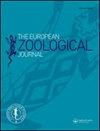hippocrepis和Malpolon monspesulanus痔疮的比较细胞遗传学突出了Columbridae和Psammophidae的不同核型(Squamata:蛇)
IF 1.6
4区 生物学
Q2 ZOOLOGY
引用次数: 1
摘要
尽管对鳞片进化细胞遗传学的兴趣日益浓厚,但大多数分类群缺乏染色体数据。本文对两种动物进行了初步的分子分类学分析和细胞遗传学比较。我们采用标准核型、Chromomycin A3/甲基绿染色、c带、Ag-NOR染色和NOR-FISH相结合的方法,首次描述了希波crepis的核型,并重新描述了monspessulanus的核型,包括染色体标记、异染色质模式和性染色体系统。结果表明,希波crepis有2 n = 36条染色体,其中宏染色体16条,微染色体20条,第6对为NORs。第4对为同态(异心)性染色体ZW,但W染色体是完全异色的。Malpolon monspessulanus有2 n = 44条染色体,其中宏染色体20条,微染色体24条,第6对远心染色体为NORs。第4对为性染色体(ZZ/ZW),其中W染色体比Z小,完全异色。将我们的细胞遗传学数据与文献中已有的数据进行比较,我们注意到原始和衍生染色体特征的发生和分布,并讨论了分别属于蛇科和沙棘科的两个蛇分支的染色体多样化。我们强调,这两个家族遵循不同的染色体多样化途径,其特点是Colubridae具有高度保守的核型结构,而sammophiidae具有较高的染色体变异性,主要是由染色体融合导致的染色体数量的逐渐减少所驱动的。我们还提供细胞分类学的见解,支持M. monspessulanus和M. insignitus之间的区别。本文章由计算机程序翻译,如有差异,请以英文原文为准。
Comparative cytogenetics of Hemorrhois hippocrepis and Malpolon monspessulanus highlights divergent karyotypes in Colubridae and Psammophiidae (Squamata: Serpentes)
Abstract Despite the growing interest in the evolutionary cytogenetics of squamates, chromosomal data are lacking for most taxa. We performed a preliminary molecular taxonomic analysis and a comparative cytogenetic study on Hemorrhois hippocrepis and Malpolon monspessulanus. We used a combination of standard karyotyping, Chromomycin A3/Methyl green staining, C-banding, Ag-NOR staining and NOR-FISH to provide the first karyotype description of H. hippocrepis and a re-description of the karyotype of M. monspessulanus, including chromosome markers, heterochromatin patterns and sex chromosome systems. Our results show that H. hippocrepis has 2 n = 36 chromosomes, with 16 macro- and 20 microchromosomes and NORs on the 6th pair. The 4th pair represents homomorphic (metacentric) ZW sex chromosomes, but the W chromosome is completely heterochromatic. Malpolon monspessulanus has 2 n = 44 chromosomes, with 20 macro- and 24 microchromosomes, NORs on the 6th telocentric pair. The 4th pair represents the sex chromosomes (ZZ/ZW), with a W chromosome smaller than the Z and completely heterochromatic. Comparing our cytogenetic data to those available from the literature, we note the occurrence and distribution of primitive and derived chromosomal characteristics and discuss the chromosome diversification in two snake clades belonging to Colubridae and Psammophiidae, respectively. We highlight that these two families followed different chromosome diversification pathways, characterised by a highly conserved karyotype structure in Colubridae and a higher chromosome variability in Psammophiidae, mostly driven by a progressive reduction of the chromosome number by means of chromosome fusions. We also provide cytotaxonomic insights supporting the distinction between M. monspessulanus and M. insignitus.
求助全文
通过发布文献求助,成功后即可免费获取论文全文。
去求助
来源期刊

European Zoological Journal
Agricultural and Biological Sciences-Animal Science and Zoology
CiteScore
3.10
自引率
5.60%
发文量
80
审稿时长
30 weeks
期刊介绍:
The European Zoological Journal (previously Italian Journal of Zoology) is an open access journal devoted to the study of all aspects of basic, comparative and applied protozoan and animal biology at molecular, cellular, tissue, organ, organismal, population, and community-ecosystem level. Papers covering multiple levels of organization and integrative approaches to study animal form, function, development, ecology, evolution and systematics are welcome. First established in 1930 under the name of Il Bollettino di Zoologia, the journal now has an international focus, reflected through its global editorial board, and wide author and readership.
 求助内容:
求助内容: 应助结果提醒方式:
应助结果提醒方式:


